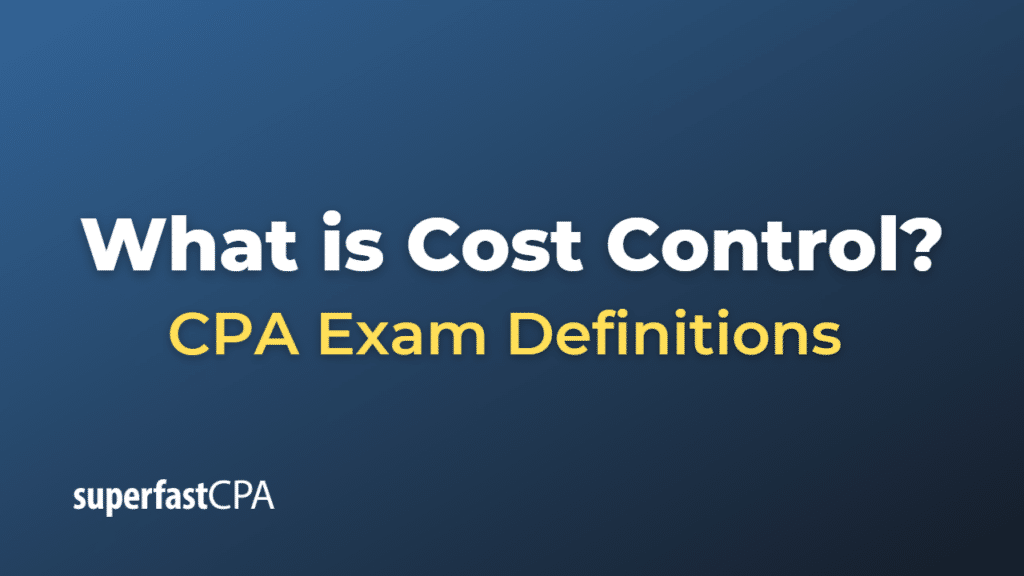Cost Control
Cost control refers to the process of monitoring, analyzing, and managing an organization’s expenses to ensure they remain within predefined limits or budgets. The primary objective of cost control is to optimize resource allocation, minimize waste, increase efficiency, and ultimately maximize profitability without compromising the quality of products or services.
Cost control involves several activities, including:
- Budgeting: Establishing budgets or spending limits for various departments, projects, or activities to provide a framework for managing costs.
- Expense tracking: Monitoring and recording all expenses incurred by the organization to maintain a clear picture of its financial situation and ensure transparency.
- Variance analysis: Comparing actual expenses to budgeted amounts to identify discrepancies or variances. This helps organizations understand the reasons for cost overruns and take corrective action as needed.
- Performance measurement: Evaluating the efficiency and effectiveness of operations, processes, and projects to identify areas for improvement and potential cost savings.
- Cost reduction strategies: Identifying and implementing measures to reduce costs, such as process improvements, waste reduction, and leveraging technology to improve efficiency.
- Reporting: Providing regular financial reports to management and stakeholders, highlighting key cost-related information and trends to support decision-making and maintain accountability.
- Continuous improvement: Regularly reviewing and refining cost control practices to ensure ongoing optimization and adapt to changing business conditions or market demands.
Effective cost control is essential for organizations to maintain financial stability, competitiveness, and long-term sustainability. By closely monitoring and managing expenses, companies can make better-informed decisions, allocate resources more efficiently, and achieve their financial goals.
Example of Cost Control
Let’s consider a fictional event management company called “Party Planners Inc.” that organizes corporate events, weddings, and parties. The company has been experiencing cost overruns in recent projects, which have led to decreased profitability. To address this issue, Party Planners decides to implement cost control measures to manage expenses more effectively and improve its financial performance.
- Budgeting: The company establishes budgets for each project, including separate budgets for various cost categories, such as venue rental, catering, decorations, and entertainment. This provides a clear framework for managing project expenses and helps prevent overspending.
- Expense tracking: Party Planners implements an expense tracking system that enables staff to record and monitor all project-related expenses in real-time. This ensures transparency and allows for prompt identification of any cost overruns.
- Variance analysis: The company regularly compares actual expenses to budgeted amounts, identifying any discrepancies or cost overruns. This enables them to address issues quickly and adjust future budgets based on lessons learned.
- Performance measurement: Party Planners evaluates the efficiency and effectiveness of its event planning and execution processes, identifying areas for improvement and potential cost savings. For example, they might find that working with certain vendors is more cost-effective or that streamlining the event setup process reduces labor costs.
- Cost reduction strategies: The company identifies and implements measures to reduce costs, such as negotiating better deals with vendors, using energy-efficient lighting for events, and reducing waste in catering services.
- Reporting: Party Planners provides regular financial reports to management, highlighting key cost-related information and trends. This allows management to make informed decisions and maintain accountability for financial performance.
- Continuous improvement: The company continually reviews its cost control practices and refines them to ensure ongoing optimization and adapt to changing market conditions or client demands.
By implementing these cost control measures, Party Planners Inc. successfully manages its expenses, improves its financial performance, and increases its competitiveness in the event management industry. This enables the company to invest in growth opportunities, maintain a stable financial position, and achieve long-term sustainability.













